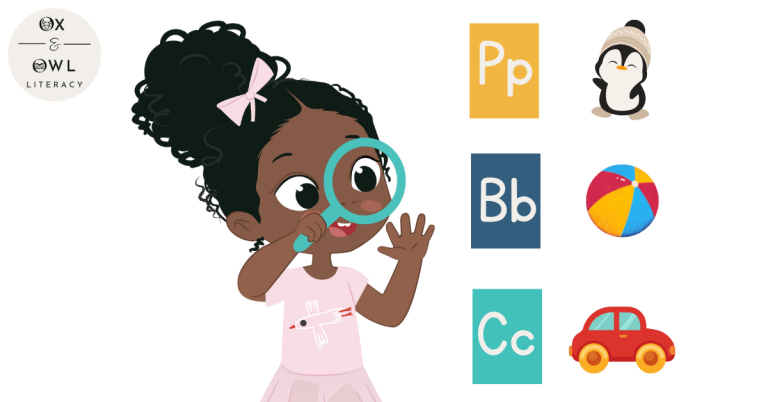OOliteracy Milestones Series: Preschoolers 4-5 Years Old
Gain insight into the literacy milestones of 4-5 year olds, discovering the amazing ways they are learning and growing every day. There are many ways we can support their development and interest in language and stories!

Unlocking the world of literacy for preschoolers aged 4-5 is like opening the door to endless adventures and boundless possibilities. At this magical stage of development, children are not only absorbing stories but also beginning to create their own. They’re mastering the art of conversation, recognizing letters and numbers, and diving into the captivating realms of pretend play.
Preschooler Literacy Milestones: Ages 4-5 Years Old
Understanding the key literacy milestones for preschoolers aged 4-5 years helps guide their development and ensure they are on the right track. These milestones encompass a range of skills, from listening and speaking to reading, writing, and early numeracy.
As you explore the wonderful world of literacy milestones, remember that each child grows and learns at their own unique pace. These milestones are meant to be gentle guideposts, not strict rules. Embrace your child’s individual journey and avoid putting pressure on either of you.
Learning should be a joyful adventure filled with fun, play, and the freedom to explore and make mistakes. Keep the experience light-hearted and engaging, celebrating their discoveries and victories along the way.
Let’s make literacy development a warm and inviting experience for your little one!
| Literacy Milestones | 4-4.5 Years | 4.5-5 Years |
|---|---|---|
| Expands from simple words and short phrases to more complex words and sentences. | ✔ | |
| Understands the main idea and key details of a story. | ✔ | |
| Growing interest in pencils, paper, crayons, and other material related to reading and writing. Shows improved control over writing tools. | ✔ | |
| Understands that print carries a message, that in English, words are read from left to right, and pages are read from top to bottom. | ✔ | |
| Understands and uses location words, like ‘in’, beside’, ‘on’, and ‘behind’. | ✔ | |
| Uses more words for time correctly, such as ‘morning’, ‘before’, ‘yesterday’, and ‘after’. | ✔ | |
| Follows simple directions and rules to play games. Can follow 2-3 step directions. | ✔ | |
| Takes turns in group games and activities. | ✔ | |
| Recognizes numbers and counts objects up to 10 or beyond. | ✔ | |
| Uses 2000+ words and can combine words to make 4-5 word sentences. | ✔ | |
| Growing a developing awareness of syllables. | ✔ | |
| Able to engage in some aspects of rhyming games and activities – such as matching rhyming word pictures with support and guidance. | ✔ | |
| Can draw a circle and square with some amount of precision. | ✔ | |
| Produces most consonants correctly, with intermittent errors, and conversational speech is generally understandable. | ✔ | |
| Begins to use scissors to cut out simple lines and shapes. | ✔ | |
| Demonstrates understanding of primary narrative structures, often observed during pretend play, with storylines and scenarios that contain more details, characters, roles, and props. | ✔ |

Activities To Build Preschooler Literacy Skills – Ages 4-5
You can turn everyday moments into valuable learning experiences with the right tips and activities. From interactive storytelling to daily numeracy and fine motor skill challenges, discover practical ways to nurture your child’s growing abilities, these activities help set the stage for their future success in reading, writing, and learning.

Exploring the library and finding books on your preschooler’s favourite topics.
Taking part in library story times and activities for this age group.

Telling your preschooler stories, whether a real experience you and/or your preschooler had or a made-up tale.

Providing props, such as dress-up clothes, dishes, puppets, hats, cardboard box creations, blankets, and character figurines, and demonstrating how to use these props to act out simple stories.

Making connections during story read-alouds, such as pausing to say, “This character seems to really like horses, just like your sister.” In other words, helping your preschooler make associations and relate the story to their own lives and experiences.

Introducing basic mathematical concepts, such as using a growth chart to measure your preschooler’s height, sorting by colours, sizes, and shapes, and dong simple pattern recognition activities.

Reading alphabet books together which helps show relationships between letters and their sounds.
Emphasizing the letter-sound relationships in their name.

Modeling reading, writing, and drawing. Also demonstrating and verbalizing how these tasks are meaningful for you. E.g. Writing out a grocery list so you know what to buy.

Engaging in practical daily activities that incorporate applying early numeracy skills, such as helping with setting the table with the right number of plates, forks, spoons and cups.

Encouraging group play with friends to develop social skills, cooperation, and imaginative/pretend play.

Providing opportunities to do tasks involving fine motor skills, such as threading beads, fastening snaps, using tweezers to pick up small objects, zipping up zippers, buttoning buttons, using keys and locks, and manipulating gears, latches, and levers
Nurturing Little Minds, Sparking Big Dreams

I’m happy you’re here!
Hi, I’m Julie, the passionate creator of Ox & Owl Literacy. I enjoy empowering families and educators with wonderful resources to inspire fun, imaginative, and joyful learning opportunities for young kiddos. You’ll find lots of recommended books, reading resources, and creative learning activities on this site aiming to help children fall in love with language, books, reading, and the transformational power of stories.









